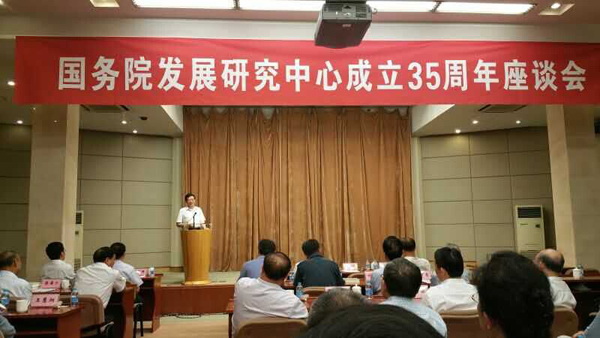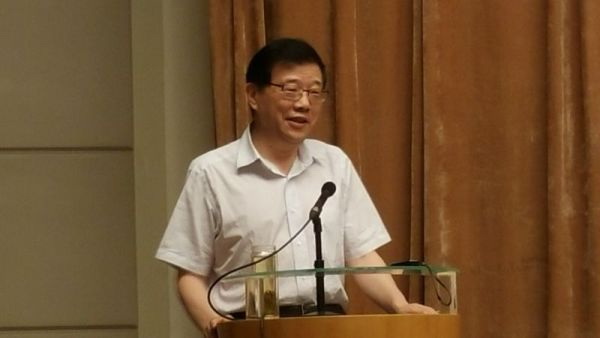DRC celebrates its 35th anniversary
Jul 15,2015
The Development Research Center of the State Council (DRC) celebrated its 35th anniversary in Beijing on July 9, with former and present leaders and staff gathering to review the DRC's development.
 |
| The DRC celebrates its 35th anniversary in Beijing on July 9. |
The DRC grew out of the State Council's Economic Research Center, Technological Economy Research Center, and the Price Research Center established in 1980 -1981. In June 1985, the State Council put the three together and formed the Economy, Technology, and Society Development Research Center of the State Council. In January 1990, the center changed to its current name- Development Research Center of the State Council- and added some staff from the formal central rural policy research office and the State Council's Rural Development Research Center. July 9, 1980 is considered as the date when the DRC was founded.
The center is the product of the times and has an honorable history, said Wang Mengkui, former President of the DRC. The DRC came out with China's development path and policy change as well as with China's major reforms and modernization drive after the Third Plenary Session of the 11th Central Committee of the Chinese Communist Party.
The DRC itself developed along with the times and it provided services for the country, Wang added.
The DRC does research based on China's real situation, focusing on practical problems, providing services for the government's decision-making, and studying issues concerning the national economy and social development.
This tradition, formed by the center's founders and leaders like Xue Muqiao and Ma Hong, is a great treasure handed down and developed over the past 35 years.
Li Wei, current President of the DRC, reviewed the center's development in the past 35 years and introduced its efforts to build a first-class think tank and the pilot program of building a national high-end think tank in recent years. In addition, he briefed the center's cooperation with the UK, France, India, Singapore, the Organization for Economic Co-operation and Development (OECD), and Shell Oil Company.
 |
| Li Wei, President of the DRC, delivers a speech. |
Li Wei said the DRC has been the brainpower of the Central Government and develops its functions in accordance with central decision-making. In recent years, the center also began to interpret policies and evaluate policies, before, during, and after policy-making and implementation. This makes the center's research even more important to the central government.
The center will innovate its policy research and decision support by improving research quality, increasing talented people, expanding international cooperation and upgrading guarantee system.
All these efforts aim to build a core think tank providing high quality services for central decision making, a key organization scientifically evaluating major policies, a new body accurately interpreting major policies, and a high-end platform efficiently integrating resources.
To become a real first-class think tank and carrier for national soft power, Li also put forward eight thoughts.
First, the DRC needs to expand policy research to around 20 influential fields and increase relevance and efficiency for central decision-making.
Second, the DRC needs to improve resource integration. It will build a policy research and consultation network with think tanks of different areas involved.
Third, the DRC will invite experts and professionals around the world to set up international and domestic advisory committees, to ask for suggestions on the center's development strategy and major issues. In addition, it will also ask for advice from top domestic scholars and official leaders for its major research projects.
Fourth, the DRC will establish a strict research quality control system and standardize its evaluation methods with a three-level review system.
Fifth, the DRC will implement a job innovation system.
Sixth, the DRC will increase foreign communication and strengthen its voices internationally.
Seventh, the DRC will establish an international development knowledge center.
Eighth, the DRC will build a national policy research information base.
Li also introduced the book Events of the Development Research Center of the State Council (1980-2013) that records the center's development for the past 35 years. The book will soon be published by China Development Press.
Taking part in the meeting also included Zhang Junkuo, Long Guoqiang, and Wang Yiming, Vice-Presidents of the DRC; Yu Bin, Director of DRC's General Office; Jin Renqing, Lu Baifu, Li Jiange, Hou Yunchun, Lu Zhongyuan, and Liu Shijin, former Vice-Presidents of DRC; Li Kemu, former member of Leading Party Members' Group of DRC; Han Jun, former Vice-President and current Deputy Director of the Central Leading Group Office of Finance and Economics; and Jiang Xingsan, former member of Leading Party Members' Group of DRC, former Director of General Office of DRC, and current Director of Board of Supervisors of All China Federation of Supply and Marketing Cooperatives.














